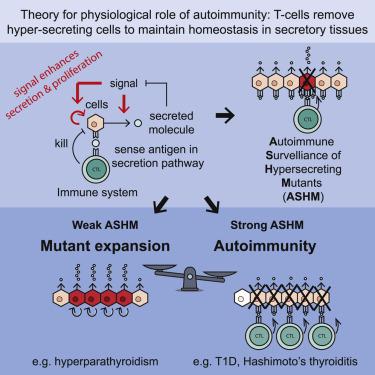Our official English website, www.x-mol.net, welcomes your
feedback! (Note: you will need to create a separate account there.)
Endocrine Autoimmune Disease as a Fragility of Immune Surveillance against Hypersecreting Mutants.
Immunity ( IF 25.5 ) Pub Date : 2020-05-19 , DOI: 10.1016/j.immuni.2020.04.022 Yael Korem Kohanim 1 , Avichai Tendler 1 , Avi Mayo 1 , Nir Friedman 2 , Uri Alon 1
Immunity ( IF 25.5 ) Pub Date : 2020-05-19 , DOI: 10.1016/j.immuni.2020.04.022 Yael Korem Kohanim 1 , Avichai Tendler 1 , Avi Mayo 1 , Nir Friedman 2 , Uri Alon 1
Affiliation

|
Some endocrine organs are frequent targets of autoimmune attack. Here, we addressed the origin of autoimmune disease from the viewpoint of feedback control. Endocrine tissues maintain mass through feedback loops that balance cell proliferation and removal according to hormone-driven regulatory signals. We hypothesized the existence of a dedicated mechanism that detects and removes mutant cells that missense the signal and therefore hyperproliferate and hypersecrete with potential to disrupt organismal homeostasis. In this mechanism, hypersecreting cells are preferentially eliminated by autoreactive T cells at the cost of a fragility to autoimmune disease. The "autoimmune surveillance of hypersecreting mutants" (ASHM) hypothesis predicts the presence of autoreactive T cells in healthy individuals and the nature of self-antigens as peptides from hormone secretion pathway. It explains why some tissues get prevalent autoimmune disease, whereas others do not and instead show prevalent mutant-expansion disease (e.g., hyperparathyroidism). The ASHM hypothesis is testable, and we discuss experimental follow-up.
中文翻译:

内分泌自身免疫性疾病是针对过度分泌突变体的免疫监视的脆弱性。
一些内分泌器官是自身免疫攻击的常见目标。在这里,我们从反馈控制的角度探讨了自身免疫性疾病的起源。内分泌组织通过反馈回路维持质量,根据激素驱动的调节信号平衡细胞增殖和清除。我们假设存在一种专门的机制,可以检测并去除错误感知信号的突变细胞,从而导致过度增殖和过度分泌,从而有可能破坏有机体内平衡。在这种机制中,分泌过多的细胞会优先被自身反应性 T 细胞消除,但代价是自身免疫性疾病的脆弱性。 “过度分泌突变体的自身免疫监视”(ASHM) 假说预测健康个体中存在自身反应性 T 细胞,以及自身抗原作为来自激素分泌途径的肽的性质。它解释了为什么一些组织会患上普遍的自身免疫性疾病,而另一些组织则不会,而是表现出普遍的突变体扩张疾病(例如,甲状旁腺功能亢进症)。 ASHM 假设是可检验的,我们讨论后续实验。
更新日期:2020-05-19
中文翻译:

内分泌自身免疫性疾病是针对过度分泌突变体的免疫监视的脆弱性。
一些内分泌器官是自身免疫攻击的常见目标。在这里,我们从反馈控制的角度探讨了自身免疫性疾病的起源。内分泌组织通过反馈回路维持质量,根据激素驱动的调节信号平衡细胞增殖和清除。我们假设存在一种专门的机制,可以检测并去除错误感知信号的突变细胞,从而导致过度增殖和过度分泌,从而有可能破坏有机体内平衡。在这种机制中,分泌过多的细胞会优先被自身反应性 T 细胞消除,但代价是自身免疫性疾病的脆弱性。 “过度分泌突变体的自身免疫监视”(ASHM) 假说预测健康个体中存在自身反应性 T 细胞,以及自身抗原作为来自激素分泌途径的肽的性质。它解释了为什么一些组织会患上普遍的自身免疫性疾病,而另一些组织则不会,而是表现出普遍的突变体扩张疾病(例如,甲状旁腺功能亢进症)。 ASHM 假设是可检验的,我们讨论后续实验。











































 京公网安备 11010802027423号
京公网安备 11010802027423号